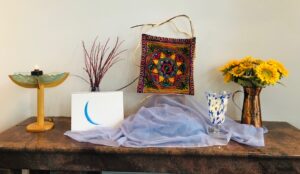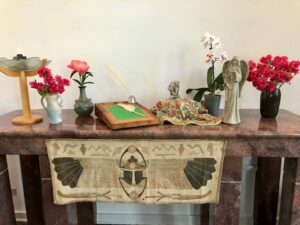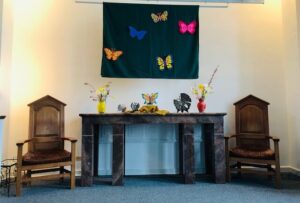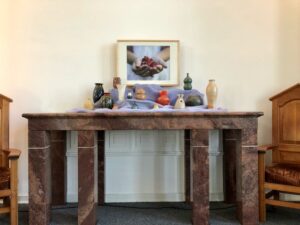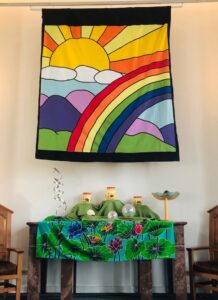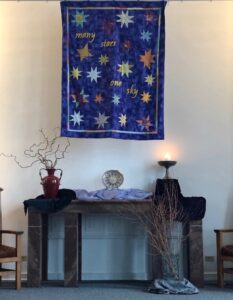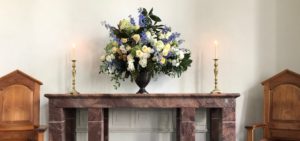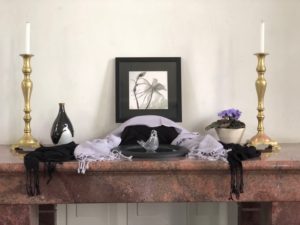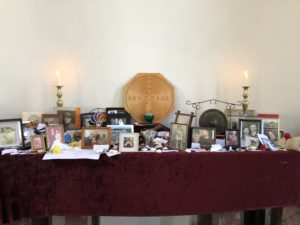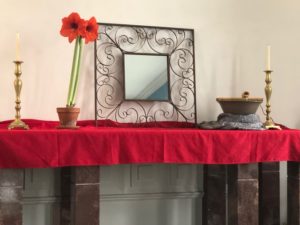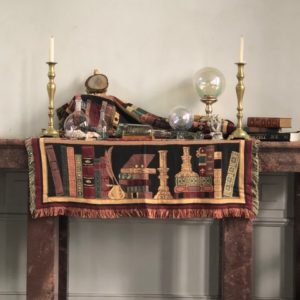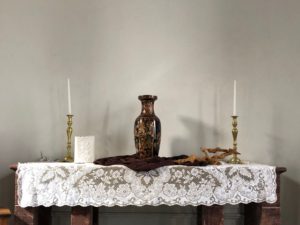Tomorrow is Martin Luther King Day. Here is a quote from MLK’s nephew, Isaac Newton Farris, Jr., who spoke this past Friday at the White House: He said: “If my uncle were here today, the first thing he would say is, “What are we or what are you doing for others?” And that’s why it was so important that my aunt, Coretta Scott King, returned to the Congress, now about 10 years ago, and asked that the meaning of the holiday be changed.
We did not want the King holiday just to be a day of hero worship. As his nephew, I certainly think that he was one of the greatest Americans that we have produced. But it should not be a day of hero worship. And that’s why the Congress agreed with my aunt, and also made it a day of service so that we, … refer to it as “a day on, not a day off.”
WAR
Yesterday the Washington Post reported: “Less than two months ago, Hawaii reinstated its Cold War-era nuclear warning sirens amid growing fears of an attack by North Korea. Tests of the sirens were scheduled to be conducted on the first business day of every month for the foreseeable future.” But yesterday around 8 am, people received an emergency alert on their cell phone that a ballistic missile threat was inbound to Hawaii and to immediately seek shelter. Forty minutes later, they received another alert saying it was a false alarm.
In South Dakota, a person can buy a bunker that was formerly used by the US military. For $25,000, they will have a place to go in case of massive devastation to our world. In Kansas, an underground community is being prepared and people can buy low, mid-range, or elite units. In case of disaster, they can go there, but will need to work four hours a day to run the community. In eastern Europe, there is at least one private bunker that includes an indoor swimming pool.
This is evidence that some folks are worried about war, terrorism, and other disasters. While the ultra-wealthy may have one way of preparing for their physical needs, everyone is affected psychologically and spiritually.
The sermon that I would like to offer you today is in response to the general malaise, a numbness, that I see among us here in the Charlottesville and the United States after a long string of events:
– the horror of August 12,
– the continued tension with North Korea.
– a president who undermines respectful moral discourse
– people who are still struggling to rebuild their homes after hurricanes and wildfires—the result of climate change—we could call them climate refugees.
All of this and more creates a kind of exhaustion.
Someone recently told me that she feels immune to the news.
She feels in my heart like her phone must feel when she doesn’t have her phone charger.
As we go through our days, these tragedies and tensions affect us on some level, even as we attempt to continue with routine of meals, activities, and sleep. For some of you, the impact is greater, depending on how your daily life was upended by these events. But for all of us, there is a horror at the erosion of what we hold good and noble and hopeful.
Part of the tensions are the rips in the fabrics of friendships and family and community when violence happens publicly. First, consider the situation here in Charlottesville. We have all heard the accusations back and forth between city leaders about how things should have been handled differently. There is a lack of trust.
While that is publicly seen, what about private loss of trust?
Less visible: within families, workplaces, and friendship circles—you may have felt strongly that a certain response was right, but someone you usually rely on and agree with acted differently.
A similar loss of trust is well documented in families that lived through the Civil War. Not only was there the obvious strain of whether a person fought for the North or South, but other strains, such as whether to share the family food with soliders, or to share the family food with people who were called “runaway slaves.”
War and other forms of public violence have a ripple effect of tension and loss of trust within the ties that usually bind us. As a response, people experience lament.
LAMENT
I used the word Lament in the title of the sermon because it gives a name to this experience.
One definition is: “express regret or disappointment over something considered unsatisfactory, unreasonable, or unfair.”
Another definition is: “to mourn aloud an unalterable loss.”
Another definition: “a song, piece of music, or poem expressing sorrow” Perhaps during the offering and meditation time, we might hear our musicians will use their instruments to express sorrow.
The human experience of lament is as natural as a thunderstorm moving across the mountains, as natural as streams converging to flow to the ocean. Whether one is lamenting about social harms in the wide world, or a private lament, it is the same warm belly, tight heart, aching throat wail.
Although lament is hugely uncomfortable, I encourage you to let it flow through you as part of the human experience of being fully alive.
And then, in that fully alive-ness, one has energy flowing for action.
What kind of action should be taken?
How can we respond to a climate of mistrust and threat?
SOCIAL GOSPEL
One source of wisdom comes from Rev. Dr. Martin Luther King, and tomorrow is the day that our nation has set aside to remember his inspiration.
I quote now from a speech he gave in 1967, entitled “Beyond Vietnam.” He delivered this address in New York’s Riverside Church to about 3,000 people. It was hosted by an interfaith, anti-war committee called Clergy and Laymen Concerned.
The war in Vietnam is but a symptom of a far deeper malady within the American spirit, and if we ignore this sobering reality, we will find ourselves organizing “clergy and laymen concerned” committees for the next generation.
A true revolution of values will soon cause us to question the fairness and justice of many of our past and present policies. On the one hand we are called to play the Good Samaritan on life’s roadside, but that will be only an initial act. One day we must come to see that the whole Jericho Road must be transformed so that men and women will not be constantly beaten and robbed as they make their journey on life’s highway. True compassion is more than flinging a coin to a beggar. It comes to see that an edifice which produces beggars needs restructuring.
In that quote, King is using a type of theology called Social Gospel. The word “gospel” can refer to many things: to the teachings of Jesus, to the good news about Christ, to a reading from the Bible, to a type of singing, or to something that is absolutely true. In this context, the Social Gospel refers to one strand of Christian teaching, especially that showed up in the United States among many Protestant preachers in the late-1800s.
These preachers of the Social Gospel were saying the good news of the gospel is not just about individuals, but about society. In the late 1800s, the preachers saw around them growing industrialization and urbanization. They saw individuals working long hours in factories while not having enough to feed and house their families in clean ways. They saw factory owners who were far away from the site and did not take action to keep safe working conditions. Their response, as they reflected on the Christian message, was to look at the promised kingdom of heaven—meaning a group of people living together in goodness. This theological interpretation led them to critique social and political systems and seek action for policies that led to more justice. This was in contrast to an understanding of Christianity as just about the suffering of a man on the cross and individuals having salvation and access to heaven. No, in the Social Gospel, across Methodist, Episcopal, Universalist, and other groups, people sought to understand what policy changes could help in the daily struggles of average folks.
Here is a quote from a book written in 1904, called the Burden of the City, by a Methodist Woman Missionary named Isabelle Horton. She said the typical working family in Chicago was overcrowded, the father unable to find employment, milk for the babies scarce, and young children trying to care for younger siblings while the mother took on extra jobs. She wrote: “to save this one family, you have to face all the problems of the modern city. The health commission, the landlord question, the pauperizing influence of alms-giving, faulty education, labor and wage problems—all are concerned in the condition of things in this one cellar.”
Note that at the time, many Christian groups participated in aid and charity work, to help people be clothed and fed. This Social Gospel was saying that another thing needs to happen too: structures needed to be changed in local government, education, access to healthcare, and labor laws.
In 1908, the Unitarians organized a Fellowship for Social Justice, and in 1909, the Universalists organized a Commission on Social Service. You will hear later in the service some of their plans. They emphasize that the conditions that support war also erode the well-being of the common good. Later, in 1961, those two groups joined and eventually, now, we have the Unitarian Universalist Service Committee. Unitarian Universalism is part of the social Gospel movement. That means the gospel that is the good news is social. It is for the good of all. It is on the earth now. That is a contrast other people preaching about individual salvation which is after this lifetime and for just one person.
ACT
Now, here in Virginia, in the year 2018, we face many of the same issues. All around us are challenges to daily life that could be improved with more just systems. And we Unitarian Universalists are part of the social gospel movement. An opportunity lies on our doorstep: This past Wednesday, in our state capitol, Richmond, just one hour away, a new legislative session began. For 60 days, you have opportunities to write your representatives, visit them, join groups that are advocating for more just policies. While the tax situation on a national level may lead to lament, our state tax situation still has hope.
NAME YOUR THEOLOGY
So, I finish today, encouraging you to take action through legislative means. And I also encourage you to be empowered to name your theology.
I am guessing that some of you have coworkers who are born again and ask you if you are, or you have a neighbor who asks about your church and what it believes, or your child tells you that other kids are talking about Jesus and they aren’t sure what to say.
You can tell your coworker, your neighbor, your child, that we are not focused on one person being saved by the suffering of Jesus and going to Heaven, but on many people being saved from suffering here and now and having Heaven here on earth.
At the beginning I described the bunkers built for billionaires. The Social Gospel does not call for individual salvation. It calls for systems that help all people be well, now, and for an end to war, so that no bunkers are needed.
Blessed be.
Amen
By Rev. Alexandra McGee ©
at the end of the service, the following was shared:
CLOSING WORDS
excerpt from A Declaration of Social Principles, by the Universalist Commission on Social Service, 1917
“War is brutalizing, wasteful, and ineffective. We therefore pledge ourselves to work for the organization and federation of the world, that peace may be secured at the earliest possible date consistent with justice for all.
The Universalist Church offers a complete program for completing humanity:
First: An Economic Order which shall give to every human being an equal share in the common gifts of God, and in addition all that he shall earn by his own labor.
Second: A Social Order in which there shall be equal rights for all, special privileges for none, the help of the strong for the weak until the weak become strong.
Third: A Moral Order in which all human law and action shall be the expression of the moral order of the universe.
Fourth: A Spiritual Order which shall build out of the growing lives of living men the growing temple of the living God.”
I keep those framed on the wall right inside the door of the ministers’ office. I encourage you to drop in and look at them.

